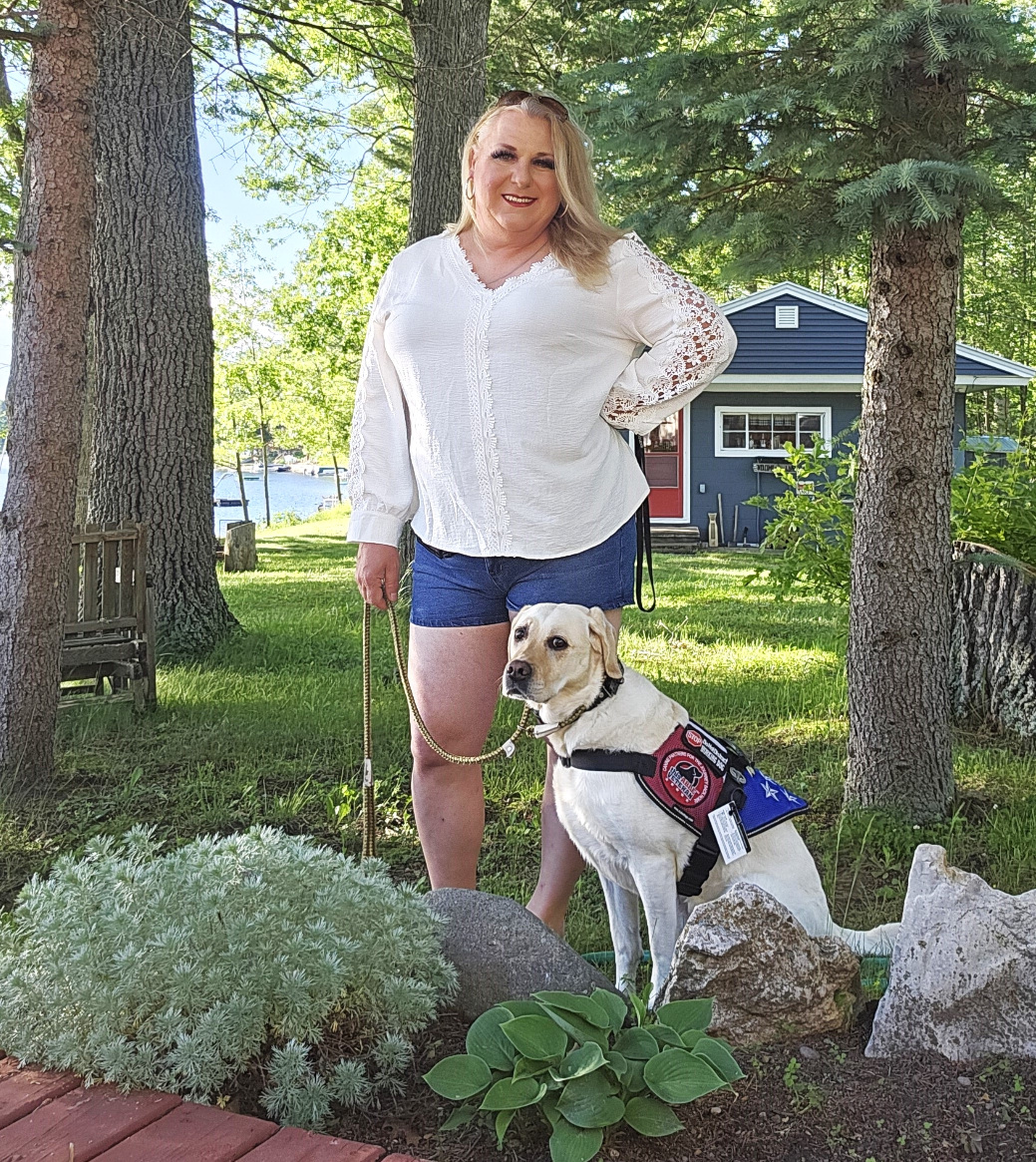

Bailey Hunter
Nora A. Simone
The difference between friends and pets is that we allow friends into our company whereas we allow pets into our solitude.
Robert Brault
My original intention was to interview Bailey Hunter for this article. An amazing transwoman, Bailey’s life story involves successfully overcoming emotional and physical challenges. Yet, my mind kept returning to Hollie, her service dog. Bailey would not, I believe, be available for this article without Hollie.
You see, day and night, Hollie helps Bailey effectively navigate life. In interviews with Bailey, I’ve learned that Hollie is much more than a navigator. She is a certified service dog specially trained to help Bailey experience a fulfilling life safely. I believe there are lessons from their special relationship and that others would appreciate learning.

Bailey Hunter
In many ways, Bailey’s life appears similar to others; career, family (including marriage and children), hobbies (especially fishing), and a love of the outdoors. She’s long appreciated dogs as family members so she was already familiar and accustomed to the unique health benefits of canine companionship. These benefits included (1) reducing stress; (2) managing anxiety; (3) increasing physical activity; and (4) combating loneliness. Widely accepted scientific research has confirmed what Bailey could have told you decades ago that was intuitively obvious to her. Dogs make good companions.
Bailey’s life has been different from the average person.

In other ways relevant to this article, Bailey’s life has been different from the average person.
Bailey is non-binary. Today she often presents as a woman, yet over 50 years ago Bailey was born a boy who was expected to act like one. Her first half-century of life was characterized by little understanding, and nearly no acceptance of gender dysphoria. Those affected, like Bailey, in the 1980’s and earlier often developed depression and anxiety, and also faced other challenges to mental and emotional well-being as a result of societal judgment, stigma, transphobia, and/or harmful stereotypes. In Bailey’s case it seemed especially traumatic. “It was horrible” says Bailey about her childhood. “My parents were not at all accepting.” As one example, Bailey reports being forced to meet with a counselor who promised her parents “We’re going to fix this!” Rightfully frightened, Bailey sought ways to escape treatments and associated shame, guilt, and depression. Her strategy included running away from home at a young age. I find this situation very sad and now wonder how many in the world feel that way today?
Due to a work-related tragedy later in life, Bailey developed serious symptoms of post-traumatic stress disorder (PTSD). Non-binary people are acknowledged to already be at higher risk to PTSD and Bailey’s experience could conceivably have added sufficient stress to trigger this outcome. About her symptoms Bailey says “these could be violent and might occur any time of day or night. They affected relationships, my ability to work, my sense of self and even my will to live.”
About Hollie…
After many years with pet dogs, Bailey was already familiar with the benefits of having one in her life. So, it was natural she’d turn to a dog for support in her time of greatest need. That is where Holly now fits in and thrives.
Bailey goes everywhere with Hollie who keeps a constant adoring watch on Bailey even when Bailey sleeps. If/when Hollie senses Bailey’s emerging PTSD symptoms she springs into action. Hollie offers attention and comfort that is custom designed to de-stress Bailey’s unique potential PTSD symptoms and thus an episode. In this way, Hollie’s constant watchful companionship and attention makes Bailey’s life more predictable and productive.


In case you were wondering, Hollie does get some downtime. To outsiders who are unfamiliar with the practice; when Hollie is wearing her service dog vest, she is on the job. Without her vest, Hollie is not working, yet always has Bailey within sight or earshot just in case.
Interesting. Hollie instinctually senses a difference between Bailey versus Bailey’s male persona! The reason, Bailey reports is that “As Bailey I am calmer and more relaxed, so Hollie feels less need to be on high alert.” Don’t you find this ability extraordinarily beautiful?
To some people, Hollie is just a dog. So, Bailey wants others to know that service dogs like Hollie are highly trained to help a person with their unique disabilities. If you see service dogs out and about with their owners, please assume they are working and should not be distracted.
Today…
Bailey says “I used to constantly be fearful of being found out. Now, because of Hollie, I am more in tune with myself. I know it’s OK to be me and thus I am comfortable speaking about it.”
When I asked Bailey what one question she’d put to Hollie if guaranteed an honest answer, she was uncertain. Well, we still do not know what that question would be. I now figure a response is unnecessary. You see, Bailey and Hollie effectively communicate all the time – so there is no need for Bailey to ask one more question. In the past few years, Hollie has proven to be reliable, full of love, true in her affections, predictable in her actions, grateful, and loyal. Wouldn’t it be wonderful to have such a good friend as Hollie?
You may be wondering “Can any dog be a Hollie?” The simple answer is “no” as the training requirements to be a service dog are long and rigorous. Yet with dog’s capacity for trust, love and commitment any relationship would, I believe, be beneficial. As speculated in previous writing, Isn’t every pet a service animal?
Lesson Learned
If you care about animals, you likely will also care about people. If you’ve difficulty caring about people, including yourself, start with an animal such as a dog. There is no limit to your capacity to care and love. More is better.
